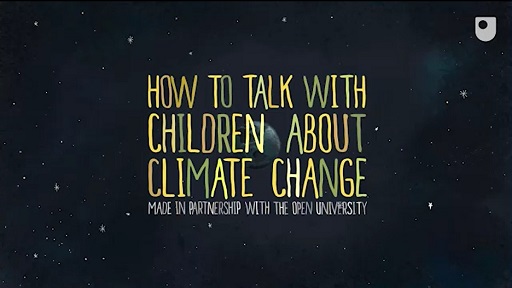2 Climate anxiety
Please note that as you work through this section, there may be content or activities that you find difficult because of your own experiences of mental distress, or those of others close to you. Suggestions of steps you can take to support your own mental health and wellbeing while you study are included.
If you need more immediate help and are based in the UK, you can contact:
- Samaritans – Tel: 116 123
- Mind – Tel: 0300 123 3393
- SANEline – Tel: 0300 304 7000 (4pm-10pm)
- your local GP for medical advice by making an emergency appointment
- NHS (England & Wales) Tel: 111, NHS 24 (Scotland) Tel: 08454 242424, NI Direct (Northern Ireland) Tel: 0808 808 8000
- or go to Accident and Emergency (A&E).
Any educator addressing the climate crisis will need to have strategies for supporting their learners’ emotional responses to climate change, and for taking care of their own wellbeing. In this section of the course, you’ll consider the impact of climate anxiety and how learners can be supported in coping with it, and you’ll explore some strategies for taking care of your own wellbeing.
There is a growing awareness of the anxiety and distress that people experience around the climate and ecological crises, even when they have yet to experience their effects personally. Various terms are used to describe these feelings, including climate anxiety, climate distress, eco-anxiety, eco-despair, eco-depression, solastalgia and climate grief. None of these terms adequately capture the range of emotions that people feel, which might include fear, grief, guilt, shame, stress and anger, as well as anxiety.
Researchers have identified multiple, overlapping forms of anxiety and depression in relation to climate change. At their most severe, they can lead to a complete inability to enjoy life, and to thoughts of suicide. Common feelings include a sense of hopelessness and powerlessness.
Some groups are more prone to anxiety and distress than others, including people whose livelihoods and identities are closely connected with the land and those who experience natural disaster in early childhood (Hrabok, Delorme and Agyapong, 2020). While young people and women report higher levels of climate anxiety than other groups, Pihkala (2020) suggests this may be because it is repressed and under-reported. This can be accompanied by an unhelpful tendency to dismiss others’ anxiety as overreaction. Those considering parenthood or thinking about their grandchildren also report greater anxiety.
There’s increasing concern about the extent of climate anxiety in young people and its impact on their day-to-day lives. A survey of 10,000 16- to 25-year-olds across 10 countries found that respondents in all countries were worried about climate change, and 59% were extremely worried (Hickman et al., 2021). A perceived failure of governments exacerbates the distress. The extent of anxiety and its impact on young people’s ability to function is worst in the Global South, where climate change has the greatest impact.
Psychologist Caroline Hickman (2020) describes the additional burden experienced by children, saying that what frightens them most is the failure of adults to take climate change seriously, while simultaneously dismissing, pathologising or even criminalising their attempts to make their voices heard.
Activity 2 Coping with emotions
Part 1
Watch the following video, which focuses on the anxiety that children and young people experience in relation to the climate emergency.

Transcript: Video 2 How to talk with children about climate change
Part 2
Reflect on your own experience since starting this course. In the box below, note the different emotions that thinking about the climate emergency has prompted for you. If you feel comfortable doing so, you could share your list of emotions with a trusted friend, family member or colleague.
Part 3
If you’re an educator, in the broadest sense of the term, reflect on the extent to which you feel equipped to support your learners in coping with emotions related to the climate emergency and any strategies you’ve used to date (where relevant).
